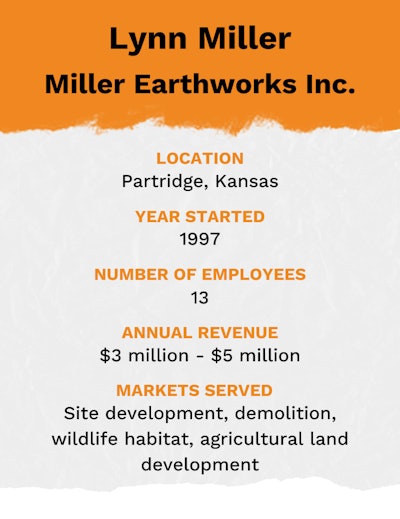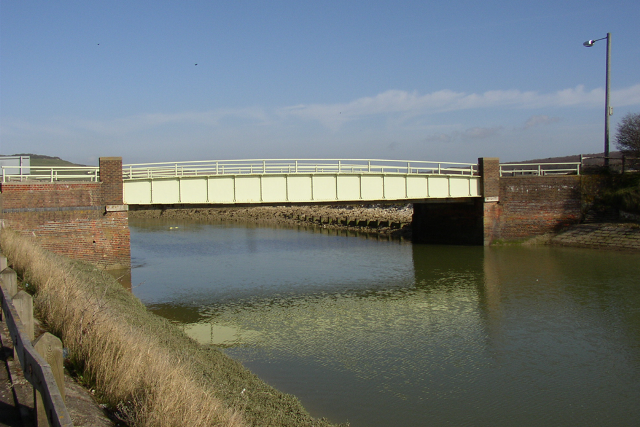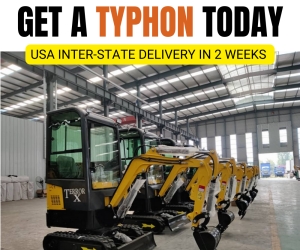Kansas Contractor Follows Slow-Growth Strategy to Build Company
He’s gone from a one-man show running a trencher to building wildlife habitat, site development, demolition and more.


He worked side jobs for his uncle’s plumbing and heating and air conditioning business running a trencher.
“Anytime you’ve got digging to do, unless we're in the middle of harvest, you go dig,” his father told him.
That was the beginning of his construction career.
In 1997, he bought the trencher from his uncle to start his own business, Miller Trenching Service. Today the company has expanded away from trenching to residential improvements, building wildlife habitats for duck hunting, pipeline company work, municipal clearing and utility jobs, and agricultural-related work.
“Because we're in the Midwest and because it's small town, very rural, you kind of have got to do everything,” he says.
He’s gone from a one-man show to 13 employees. The company earns $3 million to $5 million in annual revenues and has rebranded to Miller Earthworks to reflect its growth. He’s built a loyal following of customers and attracts new ones because of those relationships.
For that and more, Miller is one of our 12 finalists for the 2024 Contractor of the Year Award.
Slow Going
Miller’s new company grew slowly.
Three years after buying his uncle’s trencher, he bought a backhoe. He bought his first excavator in 2002. He didn’t hire his first employee until 2006. It was just he and his wife, Sandra, running the business out of their home before that.
The couple struggled to stay afloat. He borrowed money from a local man to keep the business going. At one point, he couldn’t make the loan payment. The man’s response stunned him. It still gives him goosebumps today.
“He looked at me and he said, ‘You know what? You just pay me whenever you can.’”
It didn’t take them long to pay him off.
“The thing that impacted me is he gave me an opportunity when he wouldn't have had to,” Miller says. “It's important for me to remember that. I need to give others opportunities just like I’ve been given opportunities.”
Shifting to Sales
 Miller Earthworks
Miller Earthworks
Miller loves running equipment, but he found it more difficult to be out in the field. His crew noticed too.
“Every time I would sit on a piece of equipment, I would get a phone call, and it just ruined everything they were trying to do,” he says. “It got to the point they were like, ‘You may as well stay at the office.’”
Around 2017, he shifted to full-time sales, a switch he’s glad he made.
“I love to run equipment,” he says. “But I also love to talk to people. I love to solve people's problems.
“That's exciting to me. That's what makes me tick.”
He had to admit to himself that his workers knew as much about the jobs as, and in some cases more than, he did.
“It really freed everybody up,” he says. “It freed them up; it freed me up.”
Equipment Efficiency
 Miller Earthworks
Miller Earthworks
The company uses a vac truck to win projects for pipeline companies in the area. The companies store their petroleum products in caverns in a salt layer about 300 feet down. The company uses its vac truck to remove brine water from the caverns to maintain the proper pressure, so the caverns won’t collapse.
Thanks to the company’s use of scraper tractors, it has landed work with Ducks Unlimited to build duck marshes.
“We use our scraper-tractor setup more than ever, and it has actually gotten us jobs because of being able to move dirt very efficiently,” Miller says. “You move so much more dirt than, say, a paddle scraper, a dozer or something like that.”
The company also prefers reduced-tailswing excavators.
“It doesn't matter if you're working in tight spaces, with traffic, or maybe it's trees that you're taking out,” he says. “You just don't have that counterweight to swing away out there. And that's been a huge thing for us.”
The company moved to Trimble machine control a couple years ago – 3D on excavators and 2D for dozers and tractor scrapers. It’s helped the company in its jobs.
“A large percentage of our jobs are design-build; they don't have a plan,” he says. “We're able to design something that works with that GPS.”
Keeping Employees Happy
 Miller Excavating
Miller Excavating
And there’s a reason for that. Miller believes in sticking to a 50- to 55-hour work week, so employees can go home and be with their families. They also don’t work nights and weekends.
“I lose jobs because of it,” he says of his business model.
He guarantees each worker 40 hours a week year-round – no seasonal layoffs – and he keeps most of the jobs within a 30-minute drive, an hour at the most.
He also offers some interesting perks.
Every employee has a company credit card for buying lunch for themselves and customers they are with on a job.
“We do a lot of jobs where an employee might be working with a customer, and it's just the two of them,” Miller explains. “Why would you sit under a tree and eat your lunch or sit in the pickup and eat lunch while the customer runs down and gets something to eat?
“You go to town; you buy the customer lunch. You interact with them. You build that relationship.”
He buys all their work clothes and PPE. He keeps shelves full of snacks for them to take to the jobsite, and each truck has a cooler filled with drinks.
One of the biggest employee benefits comes at the end of the year at the annual Christmas party. That’s when the profit-sharing checks are presented, as well as gift cards ranging from $1,200 to $3,200 at an outdoors retailer.
“Guys can come away from that with four or five grand in their pocket, plus profit sharing,” he says.
It’s all part of his strategy to treat employees well, because he views them as responsible for the company’s success.
“I tell my guys pretty regularly, if it wasn't for them, we would be nothing. … I can go out and get all kinds of jobs. But if I don't have a solid group of guys surrounding me, I can’t do anything.”
Maintaining Relationships
 Miller Earthworks
Miller Earthworks
Miller has built lasting relationships with his customers who appreciate the company’s quick response and quality work.
“I feel like the thing that sets us apart is our integrity, our efficiency and our safety,” he says. “But all of that comes with a price. So what sets us apart is not we're the cheapest game in town; that's not the way we get our work.”
The company has achieved this through highly skilled workers, reliable equipment and efficient project management. His daughter Vanessa has also joined the company as office manager, taking over the role her mother performed, and bringing in new technology, marketing and social-media posts to grow the company.
“They operate with high character, professionalism and respect,” says John Niemann, owner of Prime Dirt Midwest. “I’ve used them 10 to 15 times, and every time, they’ve delivered. Their care for their equipment and my land as stewards is second to none.”
“I trust him, and I think he does quality work,” adds Vance Voth, site/civil division lead for Engineering Consultants PA. “If I was hiring somebody, he'd be the first guy I'd call.”

 machineryasia
machineryasia 









